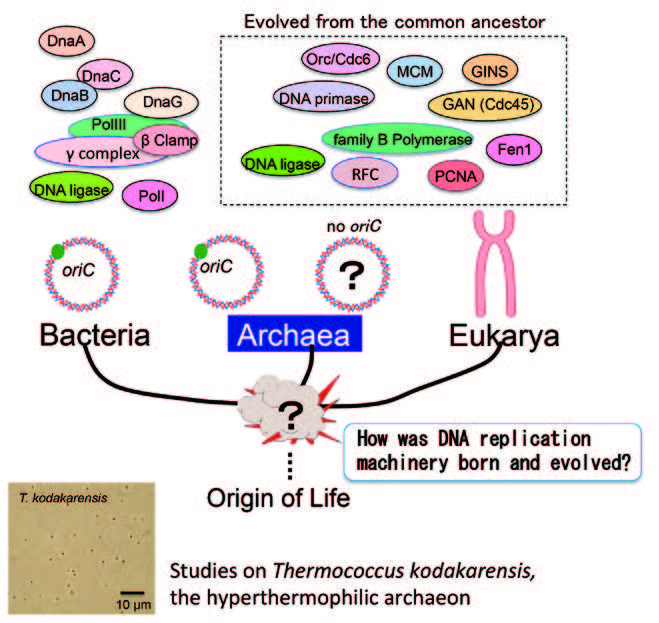研究室紹介
Biochemistry
We are studying on genetic information processing systems and its application to development of new technology for genetic engineering as follows below. 1) Studies on the molecular mechanisms of DNA replication, recombinational repair, gene expression, and RNA processing in the hyperthermophilic organisms, especially archaea, the third domain of life. 2) Application of DNA-or RNA-related proteins (enzymes) to development of novel genetic engineering techniques. 3) Basic analyses of molecular recognition mechanism of the proteins involved in DNA metabolisms. 4) Application of metagenomic data for creating useful enzymes for genetic engineering.

Research Interests
1. Molecular mechanisms of DNA replication, repair, recombination, and RNA processing in hyperthermophiles
2. Application of DNA- or RNA-related proteins to the development of new genetic engineering technologies
3. Basic analysis of molecular recognition mechanisms of proteins involved in DNA metabolism
4. Monitoring the marine environment using metagenomic methods
The molecular mechanisms of DNA replication, repair, recombination, transcription, and translation are central to the study of molecular biology. The elucidation of the molecular mechanisms of maintenance and transmission of genetic information such as DNA replication, repair, recombination, transcription, and translation is a central theme in molecular biology, and there are countless laboratories around the world that are working on these topics. The Biochemistry Laboratory is unique in that it uses Archaea (primitive bacteria in Japanese), which are considered to be the third organisms, as model organisms. Archaea look similar to bacteria at first glance, but they are clearly different from eubacteria such as Escherichia coli, Lactobacillus acidophilus, and Bacillus subtilis in terms of evolutionary phylogeny, and they are also different from eukaryotes including us humans, so they are called the third organisms. Interestingly, proteins involved in the genetic information system share a common ancestor in Archaea and eukaryotes. Therefore, it is hoped that the study of Archaea will help us to understand the underlying principles of genetic information transfer and maintenance that occur in our human cells. What is even more interesting is that the biochemistry laboratory is dealing with hyperthermophilic Archaea that can grow at temperatures as low as 100 degrees Celsius. Molecular biology using hyperthermophilic Archaea is a very exciting area of research because it allows us to understand the mechanisms of maintenance of life phenomena under extreme conditions and to analyze higher-order complexes such as replisomes using the highly stable proteins produced by this organism. Furthermore, we continue our research with the aim of developing novel genetic and protein engineering technologies using the many DNA-related enzymes and protein factors obtained through these basic studies.












 Contact
Contact
 Access Map
Access Map

